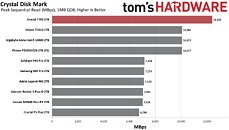- Joined
- Oct 9, 2007
- Messages
- 47,654 (7.44/day)
- Location
- Dublin, Ireland
| System Name | RBMK-1000 |
|---|---|
| Processor | AMD Ryzen 7 5700G |
| Motherboard | Gigabyte B550 AORUS Elite V2 |
| Cooling | DeepCool Gammax L240 V2 |
| Memory | 2x 16GB DDR4-3200 |
| Video Card(s) | Galax RTX 4070 Ti EX |
| Storage | Samsung 990 1TB |
| Display(s) | BenQ 1440p 60 Hz 27-inch |
| Case | Corsair Carbide 100R |
| Audio Device(s) | ASUS SupremeFX S1220A |
| Power Supply | Cooler Master MWE Gold 650W |
| Mouse | ASUS ROG Strix Impact |
| Keyboard | Gamdias Hermes E2 |
| Software | Windows 11 Pro |
Crucial T700 marks the brand's return to the high-end SSD segment after years of catering to the mainstream segment with well-priced drives that the company can move in high volumes. The company had retired its Ballistix brand to mark its withdrawal from the high-end. The drive combines Micron's 232-layer 3D TLC NAND flash with a Phison E26-series controller and LPDDR4-based DRAM cache, and takes advantage of the PCI-Express 5.0 x4 host interface, with NVMe. A small section of the tech press was sampled with these drives and permitted to do performance previews.
Every SSD manufacturer's favorite benchmark, CrystalDiskMark (CDM), shows the drive clock 12.4 GB/s sequential reads (1 MB, QD8), along with 9.22 GB/s (1 MB QD1). Sequential writes are as high as 11.87 GB/s (1 MB QD8), and 9.66 GB/s (1 MB QD1). IOMeter testing revealed that the sustained write speeds are rather low, with the T700 holding onto top speeds only up to 25 GB, beyond which write performance falls off a cliff to 3.8 GB/s. Find more such interesting results in the source link below.




View at TechPowerUp Main Site | Source
Every SSD manufacturer's favorite benchmark, CrystalDiskMark (CDM), shows the drive clock 12.4 GB/s sequential reads (1 MB, QD8), along with 9.22 GB/s (1 MB QD1). Sequential writes are as high as 11.87 GB/s (1 MB QD8), and 9.66 GB/s (1 MB QD1). IOMeter testing revealed that the sustained write speeds are rather low, with the T700 holding onto top speeds only up to 25 GB, beyond which write performance falls off a cliff to 3.8 GB/s. Find more such interesting results in the source link below.




View at TechPowerUp Main Site | Source





